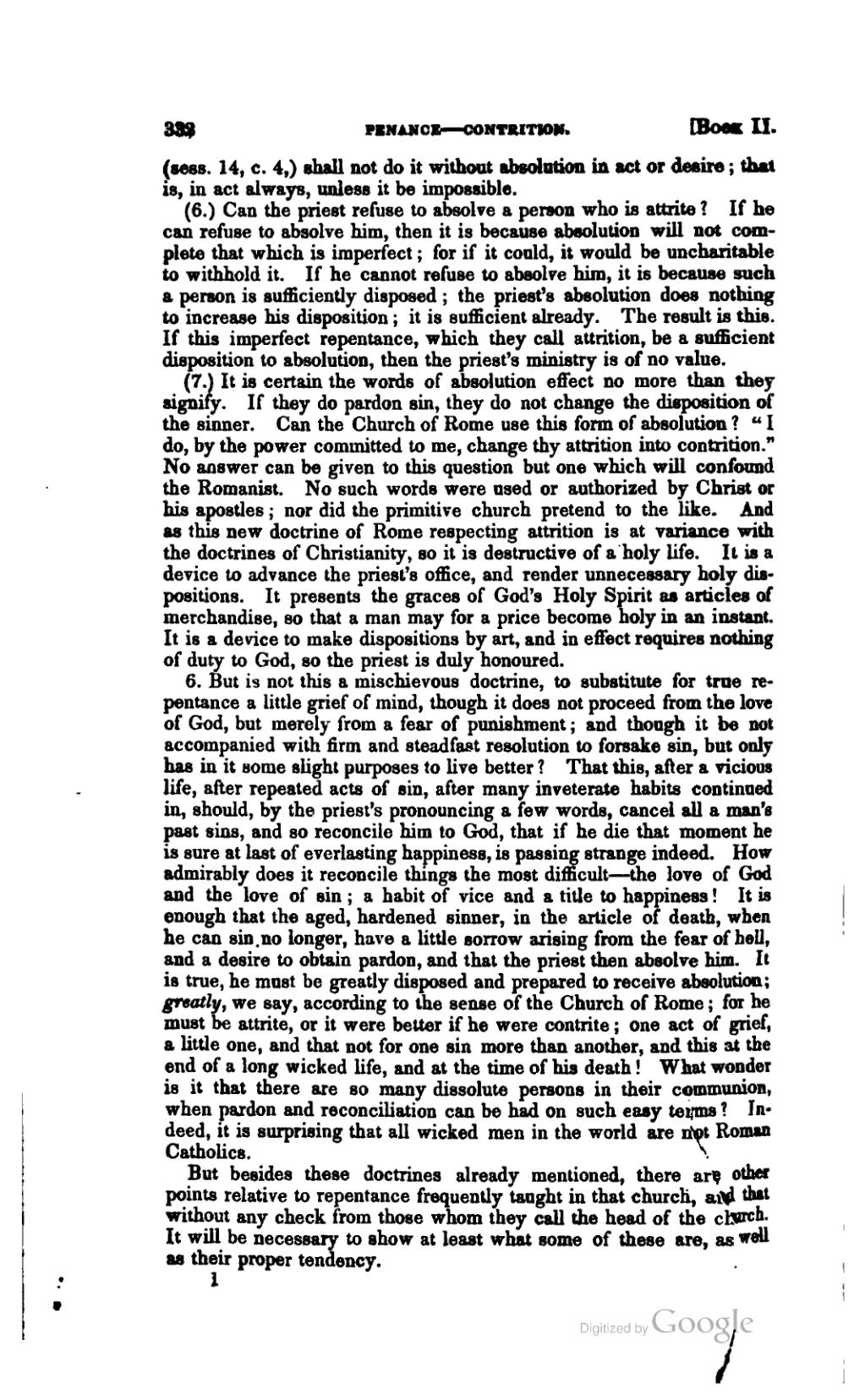? L'INA. N OE,,--(X)NTB. ETION, ? .(se?.. 14, c. 4,) 8hall not do it without absolution in aict or desire; thin IS, In act ?ways, unless it be impossible. (6.) Can the priest re;use to absolve a person who is attrite ?. I; he can re;use to absolve him, then it is because absolution will not com- plete that which is imperfect; ;or i; it could, it would be uncharitable to withhold it. If' he cannot re;use to absolve him, it is because such a person is sufficiently disposed; the priest's absolution does nothin? to increase his disposition; it is 8uffcient already. The result is this. I; this imperfect repentance, which they call attrition, be a 8-?!icient disposition to absolution, then the priest's ministry is of no value. �(7.? It is certain the words of absolution effect no more than they mgnizy. If' they do pardon sin, they do not change the disposition the sinner. Can the Church o; Rome use th?8 ;orm of' absolution ? "I do, by the power committed to me, change thy attrition into contrition." No answer can be given to this question but one which will confound the Romanist. No such words were used or authorized by Christ or his apostles; nor did the primitive church pretend to the like. And 88 this new doctrine of' Rome respecting attrition is at variance with the doctrines of Christianity, 8o it is destructive of a'holy life. It is a device to advance the priest's offce, and render unnecessary holy dis- positions. It presents the graces o; God's Holy Spirit as article8 of merchandise, so that a man may for a price become holy in an instant. It is a device to make dispositions by art, and in effect requires nothing of duty to God, so the priest is duly honoured. 6. But is not this a mischievous doctrine, to substitute for true re- penrance a little grief of mind, though it does not proceed from the love of God, but merely from a fear of punishment; and though it be not accompanied with firm and steadfast resolution to forsake sin, but only has in it some slight purposes to live better ? That this, after a vic/ous life, after repeated acts of sin, after many inveterate habits continued in, should, by the priest's pronouncing a few words, cancel all a man's past sins, and 8o reconcile him to God, that if he die that moment he is sure at last of everlasting happiness, is passing strange indeed. How admirably does it reconcile th/ng's the most diffcult---the love of God and the love of sin; a habit of vice and a title to happiness enough that the aged, hardened sinner, in the article of death, when he can sin.no longer, hm'e a little sorrow arising from the fear of hell, and a desire to obtain pardon, and that the priest then absolve him. It is true, he must be greatly disposed and prepared to receive absolution; AmMziy, we say, accoriling to the sense o; the Church of' Rome; ;or he must be artrite, or it were better if he were contrite; one act of a little one, and that not for one sin more than another, and this at the end of a long wicked life, and at the time of his death ! What wonder is it that there are so many dissolute persons in their c?)mmunion, when pardon and reconciliation can be had on such easy tetlms ? In- deed, it is surprising that all wicked men in the world are n?t Roman Catholics. . But besides these doctrines already mentioned, there ar? other points relative to repentance frequently taught in that church, &tlli that without any check from those whom they call the head of the cl3irch. It wffi be necessary to show at least what some of these are, as well u their proper tendency. 1 Digitized by G OOg/][C /
�
